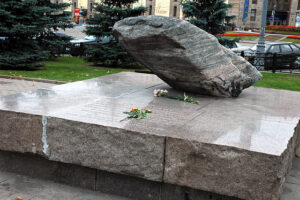
The Solovetsky stone on Lubiyanka Square in Moscow, photo by Alexei Kouprianov, source: Wikimedia Commons
When astrophysicist Kronid Lubarsky, held in prison for “anti-Soviet propaganda” in 1974, began a hunger strike to draw attention to the situation of political prisoners, he could not have expected that other inmates in prisons and camps in Mordovia and Perm – and in subsequent years prisoners across Russia – would soon protest in solidarity with him. On 30 October 1989, 3,000 people with candles in their hands surrounded the KGB building in Moscow. They wanted to show that they remembered the victims of Stalin’s crimes. They were violently dispersed by militia special units. The Day of Remembrance for Victims of Political Repression, organised at the time by the Memorial Society (Polish: Memoriał), had been unofficially celebrated in the USSR since 1974, always on 30 October. At first, it was observed only by political prisoners, and then by increasing numbers of those who organised demonstrations in major Soviet cities because they did not want to forget about this event. In 1991, the authorities of the still Soviet Russian republic (just before the collapse of the Soviet Union) recognised the day as an official holiday. Today, the Memorial International Society is illegal in Russia and the prisons are once again filled with people who have tried to express their views out loud.



